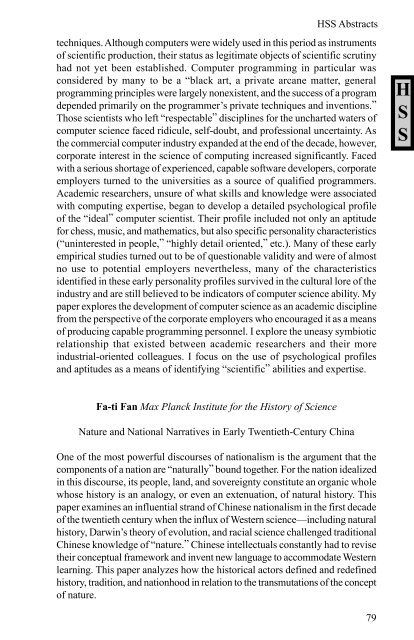2000 HSS/PSA Program 1 - History of Science Society
2000 HSS/PSA Program 1 - History of Science Society
2000 HSS/PSA Program 1 - History of Science Society
You also want an ePaper? Increase the reach of your titles
YUMPU automatically turns print PDFs into web optimized ePapers that Google loves.
<strong>HSS</strong> Abstracts<br />
techniques. Although computers were widely used in this period as instruments<br />
<strong>of</strong> scientific production, their status as legitimate objects <strong>of</strong> scientific scrutiny<br />
had not yet been established. Computer programming in particular was<br />
considered by many to be a “black art, a private arcane matter, general<br />
programming principles were largely nonexistent, and the success <strong>of</strong> a program<br />
depended primarily on the programmer’s private techniques and inventions.”<br />
Those scientists who left “respectable” disciplines for the uncharted waters <strong>of</strong><br />
computer science faced ridicule, self-doubt, and pr<strong>of</strong>essional uncertainty. As<br />
the commercial computer industry expanded at the end <strong>of</strong> the decade, however,<br />
corporate interest in the science <strong>of</strong> computing increased significantly. Faced<br />
with a serious shortage <strong>of</strong> experienced, capable s<strong>of</strong>tware developers, corporate<br />
employers turned to the universities as a source <strong>of</strong> qualified programmers.<br />
Academic researchers, unsure <strong>of</strong> what skills and knowledge were associated<br />
with computing expertise, began to develop a detailed psychological pr<strong>of</strong>ile<br />
<strong>of</strong> the “ideal” computer scientist. Their pr<strong>of</strong>ile included not only an aptitude<br />
for chess, music, and mathematics, but also specific personality characteristics<br />
(“uninterested in people,” “highly detail oriented,” etc.). Many <strong>of</strong> these early<br />
empirical studies turned out to be <strong>of</strong> questionable validity and were <strong>of</strong> almost<br />
no use to potential employers nevertheless, many <strong>of</strong> the characteristics<br />
identified in these early personality pr<strong>of</strong>iles survived in the cultural lore <strong>of</strong> the<br />
industry and are still believed to be indicators <strong>of</strong> computer science ability. My<br />
paper explores the development <strong>of</strong> computer science as an academic discipline<br />
from the perspective <strong>of</strong> the corporate employers who encouraged it as a means<br />
<strong>of</strong> producing capable programming personnel. I explore the uneasy symbiotic<br />
relationship that existed between academic researchers and their more<br />
industrial-oriented colleagues. I focus on the use <strong>of</strong> psychological pr<strong>of</strong>iles<br />
and aptitudes as a means <strong>of</strong> identifying “scientific” abilities and expertise.<br />
H<br />
S<br />
S<br />
Fa-ti Fan Max Planck Institute for the <strong>History</strong> <strong>of</strong> <strong>Science</strong><br />
Nature and National Narratives in Early Twentieth-Century China<br />
One <strong>of</strong> the most powerful discourses <strong>of</strong> nationalism is the argument that the<br />
components <strong>of</strong> a nation are “naturally” bound together. For the nation idealized<br />
in this discourse, its people, land, and sovereignty constitute an organic whole<br />
whose history is an analogy, or even an extenuation, <strong>of</strong> natural history. This<br />
paper examines an influential strand <strong>of</strong> Chinese nationalism in the first decade<br />
<strong>of</strong> the twentieth century when the influx <strong>of</strong> Western science—including natural<br />
history, Darwin’s theory <strong>of</strong> evolution, and racial science challenged traditional<br />
Chinese knowledge <strong>of</strong> “nature.” Chinese intellectuals constantly had to revise<br />
their conceptual framework and invent new language to accommodate Western<br />
learning. This paper analyzes how the historical actors defined and redefined<br />
history, tradition, and nationhood in relation to the transmutations <strong>of</strong> the concept<br />
<strong>of</strong> nature.<br />
79
















